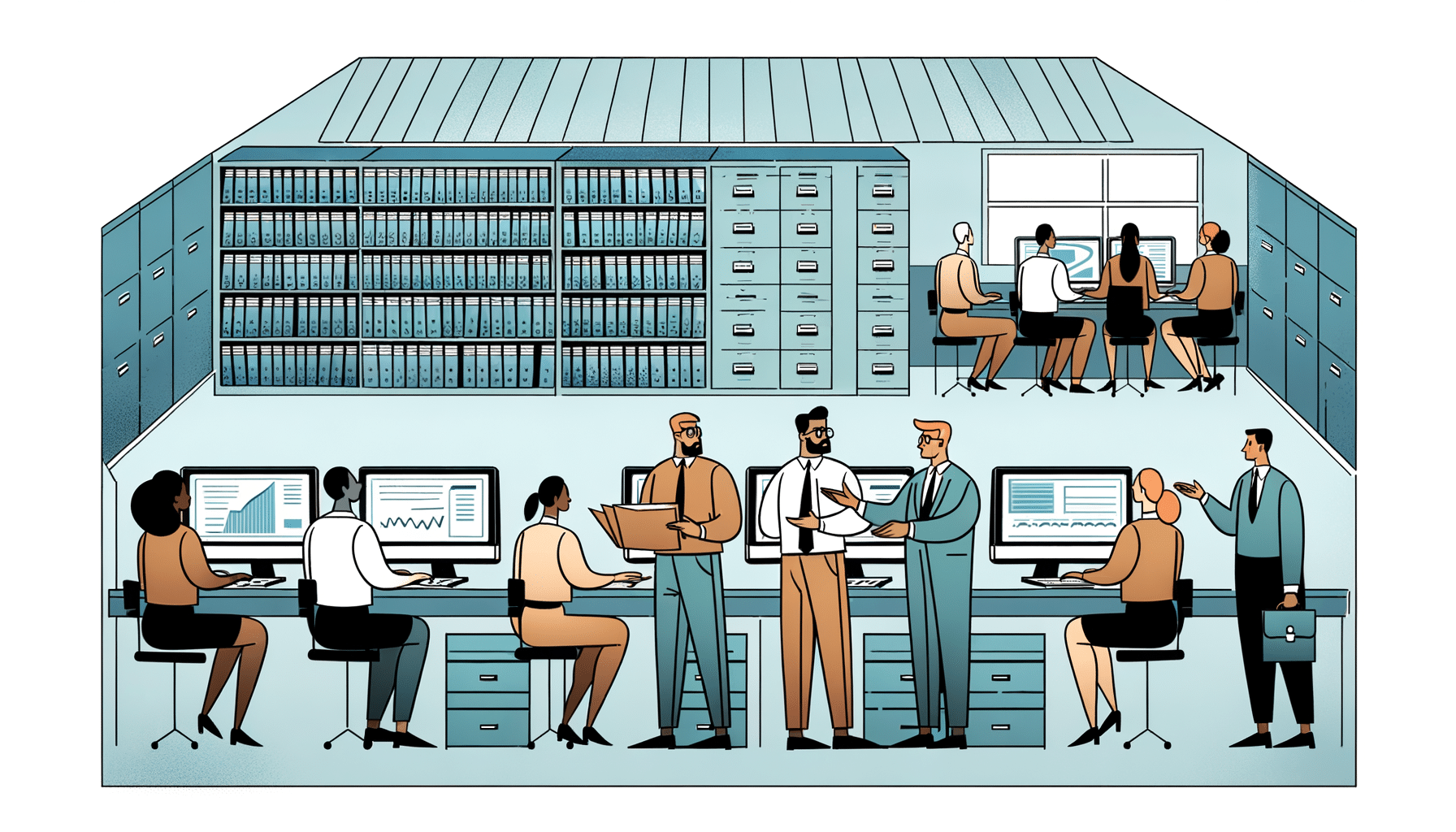- Data Synchronization
- November 16, 2024
Blockchain in Employee Record Management

In today’s fast-paced business environment, handling sensitive employee records poses significant challenges—from ensuring security and compliance to maintaining quick and efficient access. Integrating blockchain technology into employee record management offers a revolutionary approach that addresses these issues directly, transforming painstaking practices into seamless operations. As founder of RecordsKeeper.AI, I am thrilled to explore how blockchain innovations are redefining employee record management.
The Current Landscape of Employee Records
Navigating the complexities of employee record management can feel like traversing a labyrinth for HR professionals. With responsibilities involving the safeguarding of personal information, compliance with regulations like GDPR and HIPAA, and the readiness to access records for audits or legal purposes, it’s all too easy to get bogged down in administrative red tape.
Blockchain technology offers a breakthrough solution by providing a transparent, secure, and efficient method for managing employee records.
Why Blockchain?
So, what makes blockchain a game-changer in this space? At its core, blockchain employs a decentralized ledger system that ensures data integrity, immutability, and verifiability. This is particularly advantageous for managing employee records due to several reasons:
- Data Integrity: Each record is timestamped and linked to the previous one, ensuring that any changes are logged and transparent.
- Security: Cryptographic protections prevent unauthorized access, making tampering with employee records nearly impossible.
- Efficiency: Blockchain enables automated verification processes, reducing time and operational costs.
Enhancing Security With Blockchain
Employee records encompass a wide array of sensitive information, from personal identities to financial data. A breach could result in serious consequences for both employees and employers alike. Blockchain’s decentralized nature means that data is stored across a network rather than a single point. This decentralization provides an added layer of security against cyberattacks.
Moreover, blockchain ensures that any access or modification to employee records is tracked and transparent. This creates a verifiable chain of custody that reinforces trust among stakeholders.
Ensuring Compliance
Staying compliant with national and international regulations remains a priority for any organization handling employee data. Blockchain technology simplifies adherence to these standards by offering built-in audit trails. This eliminates the manual paperwork typically associated with audits and compliance checks.
For instance, using blockchain, records are automatically aligned with GDPR stipulations regarding data protection and privacy, offering reassurance to HR professionals and legal teams.
Streamlining Processes and Enhancing Accountability
The introduction of blockchain into employee record management presents an opportunity to streamline HR processes significantly. Features such as automated workflows allow HR teams to focus on strategic initiatives rather than getting caught up in documentation. Blockchain’s natural language querying enables fast retrieval of employee records, enhancing accountability and productivity across the board.
Real-world Applications
We’ve already begun to see industries adopt blockchain for record management across various domains, from finance to healthcare. For example, companies can now verify employee credential histories without resorting to time-consuming background checks, thanks to blockchain’s immutable nature. Real-time access to verifiable records is another remarkable benefit that blockchain brings to employee record management.
Challenges and Considerations
While blockchain offers immense potential, it’s important to recognize challenges like technical integration and stakeholder buy-in. Transitioning to a blockchain-based system can require significant change management to ensure compatibility with existing HR infrastructures. However, the long-term benefits of security, compliance, and efficiency far outweigh these initial hurdles.
Conclusion
As we navigate the future of employee record management, blockchain stands out as a transformative force. By enhancing security, ensuring compliance, and optimizing processes, blockchain technology positions organizations to meet both current and future demands with agility and confidence.
I invite you to explore how blockchain can revolutionize your HR processes further by leveraging platforms like RecordsKeeper.AI. Adapt to the changing landscape and unlock new opportunities in employee record management. Feel free to reach out for more insights as we continue this exciting journey together.
Toshendra Sharma is the visionary founder and CEO of RecordsKeeper.AI, spearheading the fusion of AI and blockchain to redefine enterprise record management. With a groundbreaking approach to solving complex business challenges, Toshendra combines deep expertise in blockchain and artificial intelligence with an acute understanding of enterprise compliance and security needs.
Related Posts

Managing Record Access After Staff Changes
Updating record access when employees leave or change roles.
- December 19, 2024

Record Management for Part-Time Staff
Training and monitoring part-time staff record handling.
- December 13, 2024
Archives
- December 2024
- November 2024
- October 2024
- September 2024
- August 2024
- July 2024
- June 2024
- May 2024
- April 2024
- March 2024
- February 2024
- January 2024
- December 2023
- November 2023
- October 2023
- September 2023
- August 2023
- July 2023
- June 2023
- May 2023
- April 2023
- March 2023
- February 2023
- January 2023
- December 2022
- November 2022
- October 2022
- September 2022
- March 2019
Want to get more content like this?
Signup to directly get this type of content to your inbox!!
Latest Post
Organizing External Auditor Access
- December 22, 2024
Document Control in Manufacturing Plants
- December 21, 2024
Handling Rush Financial Report Requests
- December 20, 2024
Managing Record Access After Staff Changes
- December 19, 2024





